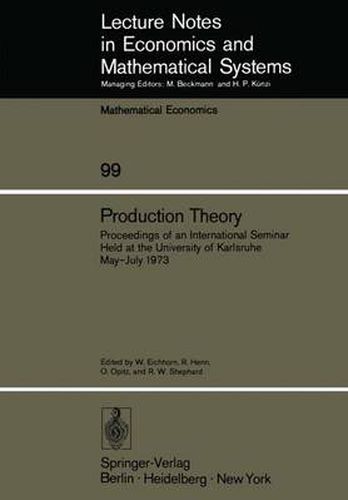Readings Newsletter
Become a Readings Member to make your shopping experience even easier.
Sign in or sign up for free!
You’re not far away from qualifying for FREE standard shipping within Australia
You’ve qualified for FREE standard shipping within Australia
The cart is loading…






This title is printed to order. This book may have been self-published. If so, we cannot guarantee the quality of the content. In the main most books will have gone through the editing process however some may not. We therefore suggest that you be aware of this before ordering this book. If in doubt check either the author or publisher’s details as we are unable to accept any returns unless they are faulty. Please contact us if you have any questions.
The first of its kind, a seminar on Production Theory was held at the University of Karlsruhe during May and June 1973. Seven of the nineteen resource participants were from Canada, France, the Netherlands, Sweden and the U.S.A., to make the seminar an international symposium. The other par- ticipants involved a variety of experts from German univer- sities. Karlsruhe supplied the predominant part of the Ger- man contributors. For the discussions of the seminar twenty papers span- ning a large part of production theory were prepared and these papers are herewith published as a coherent collection under the title: KARLSRUHE SEMINAR ON PRODUCTION THEORY. Papers on scalar valued production functions are orga- nized in Part 1. Several of these provide new characteri- zations of CES productiop functions, partly in connection with technical progress, and two others are related to homothetic production functions. Six papers on multisectoral production models have been included in Parts 2 and 3, addressed in part to problems of dynamic structures, disaggregation and relaxation of simple homogeneity. Turning next to more general production models, Part 4 contains five papers involving set valued production func- tionsor production correspondences, dealing with such topics as efficient pOints, stochastic aspects, homogeneity, homo- theticity and the law of diminishing returns.
$9.00 standard shipping within Australia
FREE standard shipping within Australia for orders over $100.00
Express & International shipping calculated at checkout
This title is printed to order. This book may have been self-published. If so, we cannot guarantee the quality of the content. In the main most books will have gone through the editing process however some may not. We therefore suggest that you be aware of this before ordering this book. If in doubt check either the author or publisher’s details as we are unable to accept any returns unless they are faulty. Please contact us if you have any questions.
The first of its kind, a seminar on Production Theory was held at the University of Karlsruhe during May and June 1973. Seven of the nineteen resource participants were from Canada, France, the Netherlands, Sweden and the U.S.A., to make the seminar an international symposium. The other par- ticipants involved a variety of experts from German univer- sities. Karlsruhe supplied the predominant part of the Ger- man contributors. For the discussions of the seminar twenty papers span- ning a large part of production theory were prepared and these papers are herewith published as a coherent collection under the title: KARLSRUHE SEMINAR ON PRODUCTION THEORY. Papers on scalar valued production functions are orga- nized in Part 1. Several of these provide new characteri- zations of CES productiop functions, partly in connection with technical progress, and two others are related to homothetic production functions. Six papers on multisectoral production models have been included in Parts 2 and 3, addressed in part to problems of dynamic structures, disaggregation and relaxation of simple homogeneity. Turning next to more general production models, Part 4 contains five papers involving set valued production func- tionsor production correspondences, dealing with such topics as efficient pOints, stochastic aspects, homogeneity, homo- theticity and the law of diminishing returns.